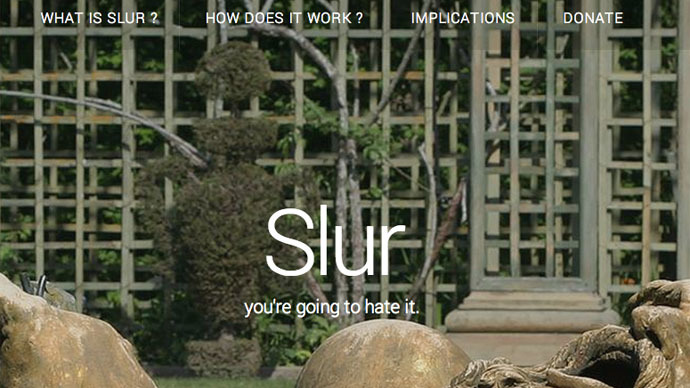WikiLeaks 2.0? Slur platform wants to be new online market for leaked info

The new Slur platform -an open source, decentralized marketplace for selling secret information for bitcoin – aims to protect whistleblowers by granting anonymity to both buyers and sellers, what WikiLeaks failed to do, the platform developer told RT.
The Slur platform will have no restrictions on types of information that can be sold or the motives behind the selling, said Thom Lauret, spokesman for u99 Group, the developer of the platform, which will be launched in July.
Sellers will encrypt and upload their data anonymously and only the winners of the auction will receive decryption keys - this will give protection to whistleblowers, he said.
The information WikiLeaks distributes “always came at a price,” said Lauret, adding that at stake was the whistleblowers’ freedom, their assets and lives. He claimed that the Slur platform will protect the material interests of its whistleblowers.

WikiLeaks which was officially launched in 2007 and since then has released thousands of sensitive documents in its quest for transparency. The leaks have contained classified materials from Afghan war logs to Guantanamo files.
Similar to WikiLeaks, Slur wants to expose information that will have the power to “decimate the authority and resources” of governments and corporations, he said.
RT: Slur as much as WikiLeaks stands for public's free access to the truth. How free is it when people have to pay?
Thom Lauret: You are correct in that the truth will come at a price. But then the information WikiLeaks distributes always came at a price. Until recently that was at the expense of the whistleblowers. They paid with their freedom, with their assets and by risking their lives. Slur introduces a balanced system that protects the material interests of whistleblowers in exchange for the risks that they take. The Slur marketplace is not exclusively for compensating whistleblowers, however. It’s a general platform for selling secret information regardless of motives. But several features of the Slur marketplace were created with the public interest in mind. Crowd bidding for instance introduces a dynamic where the public can pool their funds into a single bid and use the collective financial leverage of the group to reveal secrets that perhaps would not otherwise have become accessible. The crowd bidding dynamic can also deal a crippling economic penalty to any organization intent on suppressing a leak by winning their own secrets at auction.

RT: How do bidders know that the information they purchase is something they need?
TL: The winner of an auction has an opportunity to view the information before the seller gets paid with a network protocol holding the funds in Escrow. If the information isn’t genuine or not what was promised then it is possible to file a dispute. In that case, five randomly selected users on the network will be allowed to view the information and will vote on to whom the disputed funds should go.
RT: What effect will the introduction of the Slur project have on the online community?
TL: We hope that when the online community witnesses firsthand how convenient and profitable it has become to sell their private information and how that same information can then be turned against them. But they will see the benefit in and take the appropriate steps to protect their privacy - such as encrypting their communication and shunning services like Google and Facebook that for the past decade have been selling every detail of their users’ personal life to third parties for profit.
RT: If this Slur platform allows users to trade classified documents and court records, won't it be illegal?
TL: For the users that depends on the jurisdiction in their location. But even in locations where participation is illegal the law is unenforceable since the market shields users’ anonymity. Source code is considered protective free speech in the US, therefore it is not illegal for us to write the program so long as we don’t profit from the trades between the users - and we do not.

READ MORE: Spy Files: WikiLeaks to publish fourth series of leaks – Assange
RT: Do you think this has the potential for abuse - with governments and corporations obtaining game-changing information about their enemies or allies?
TL: In the short term, governments and corporations can use the market to their advantage. But in the long-term it will decimate their authority and resources. So we don’t consider such scenarios as abuse. There are no restrictions with regard to the types of information which can be sold because the central objective of the Slur project is to undermine and destabilize the establishment.
RT: The NSA has been trying to go after Tor users for a while now, but seemingly with little success. Do you think enough has been done to ensure this project will be NSA surveillance proof?
TL: The Tor network stands secure to the best of our knowledge, but we have taken the opportunity to armor the protocol further since this new application obviously will become a high priority target for intelligence agencies. In addition to the encryption Tor uses peers on the Slur network will have another layer of encryption based on a different line of mathematics. We’ve also built an open-source processor with security features designed to protect both the Tor relay and slow market applications. This is achieved by separating those processes from the host operating system with hardware-anchored cryptographic isolation. The system on chip is based on an OpenSPARC T1 by Sun Microsystems with substantial enhancements to the hypervisor and two cryptographic co-processors. That will be released in about a month and the designs for the development board and the logic of the system on chip will be of course open source.












